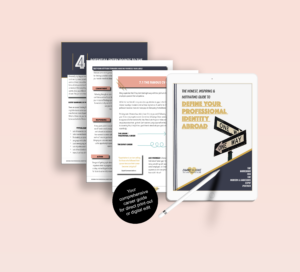
The Expat Syndrom and its best medicine
Expat Syndrome: The new beginnings
Especially new Expats are struggling with the so-called Expat Syndrome: We tend to see only the negative parts of the new culture we are living in and praise our own culture from back home. It is human and does not define your character. It’s more of a coping strategy of the human brain for an overload of uncertainty and new beginnings. However, this attitude won’t make you happy when living abroad. The chances are high that it will lead to frustration and more struggles to adapt to the new country and finding new friends. It is my experience that the moment we start to realize that we only seem to see the negative things because it’s new and therefore uncomfortable we can aim to distinguish between feelings and fact. When moving abroad, we have like 10% insight into this new culture, and it needs time and passion for completing the picture to form a constructive opinion.

How to cope with the Expat Syndrome
If you are still struggling, I can highly recommend you a short visit back home to set things in perspective! While this most make any effect in the early stage of expatriation, it has a significant impact during later stages. I would love to tell you a story from my very own experience. Last week, I traveled to Europe to celebrate my birthday with family and friends, to attend a lovely wedding, and last but not least to indulge in this great Mediterranean September sun. So I went “home” with a bag full of anticipations, a long list of things to buy & eat and a romanticized picture in my head of how things will turn out. It was a great time! Going on holiday to your old home is a wired feeling. Everything seems familiar. But it is also just like taking out your old winter clothes. You take your jacket out of the closet after a nice summer, only to realize that it that does not reflect your taste anymore. Going back to Germany was similar to me: I was observing my surrounding like a tourist, taking photos of the small town I grew up in for the first time in my life, wondering if time has stood still for the past years.
Facing the Expat Syndrome: Change of perception
When I moved to the US, I missed good German coffee. I kept saying that nobody should drink Starbucks Coffee as the quality is below any good, I was disgusted by the sheer quantity of coffee in the large coffee mugs to go (each time my environmental heart made a jump for all the waste of plastic and cups). It took me a while to find American coffee shops I liked but the moment I succeeded I started wondering why I have not seen these places earlier. Now that I know where to go my list of good coffee in Chicago is endless. I even found many that are environmentally friendly and push you not to take the to go cup. I have found my own little social bubble in a coffee shop in Chicago 🙂 Back in Germany, I went to the first bakery to enjoy good coffee (I stressed the quality of our coffee back home all the time to my American fellows) just to realize it does not taste at all! The milk was not really foamed, and the flavor had a kind of ok-ish taste. Also, I was craving for a specific pastry all the time, but I found it way too sweet after only a couple of bites. Back in America, I keep saying how unhealthy people eat and that everything is way over-sweetened. And here I am, sitting in the German bakery realizing that we also have incredible sweet stuff we love to eat drinking coffee I don’t like anymore. Fascinating how your attitude towards these things change so quickly right?
Expat Syndrome turned upside down: When you watch your own culture from far away
Another scenario: We as Expats tend to forget certain aspects of our culture we don’t really like. For me, one aspect I hate about the Germans is this fear of not having a place to sit – no matter if its a seat in a bus, a plane or the beach chair at the swimming pool of a hotel. We have been queuing for a boat in Italy when I realized all the German tourists around me started moving in the line although the ship was still not nearby so that they will be able to enter first and claim some premium seats. I just did not want to play along and felt like a 14-year-old teenager, embarrassed by her parents standing miles away from the rest of the group, entering the boat as I would not care at all where I would sit in the end. In the end, my mum was reserving me a seat next to her with a sweater, and I just had to laugh as I realized how German this situation was.
Want some good vibes in your mail?
What I want you to know about the Expat Syndrome
So what I am trying to say with these two stories is that we as Expats will change along with our journey. Things you struggled with in the beginning will come naturally to you. Know that this will happen and find ease in this fact. If you are struggling right now, you might have not the full picture, or you have a distorted image of your own culture. In the end, it is YOUR decision how you want to spend your time abroad. I have decided on curiosity and aim to trust that we only can learn from unfamiliar situations.
If you want to learn more about different kinds of Expat Syndromes I can recommend this overview by the Expat Info Desk or this funny article on Jaded Expat Syndrome.
Would love to know your thoughts on this topic and if you struggled with this kind of Expat Syndrome before. Let me know in the comments below.
Thanks for sharing the love and stopping by

Share this article with a friend and share the love:
You also might like:

Trends that shape global assignments for companies
In my research for my workbook for Expat Partners, I came across many useful facts and figures. I talked to industry leaders and HR experts, and I want to share some of the key trends at the moment that shape the global assignment movement.

How to find your professional identity abroad
How to work abroad as the Expat Partner is THE question for many of joining our partners abroad. I share my toolkit on how to build on your career while living abroad.

